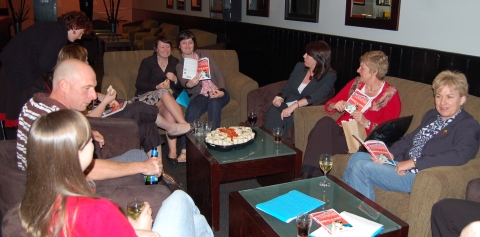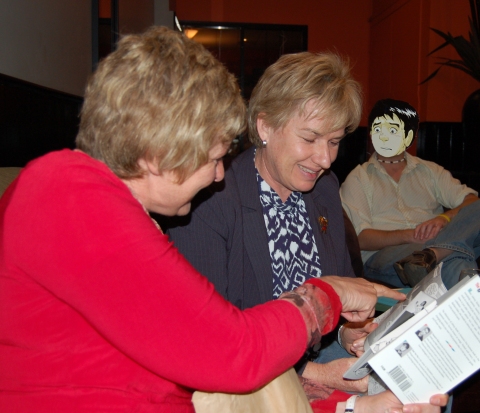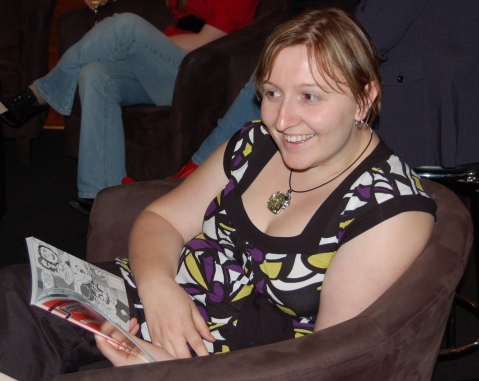Archive for September, 2008|Monthly archive page
life
My brother kept this poem in his room.
Salutation to the Dawn.
Look to this day.
For it is life, the very life of life
in its brief course
Lie all the varieties & realities of your existences
The bliss of growth
The glory of action
The splendour of achievement
For yesterday is but a dream
And tomorrow is only a vision
Today well lived makes yesterday a dream of happiness
And every tomorrow a vision of hope
Look well, therefore to this day
Such is the salutation to the dawn.
– Kalidasa
Dedicated to my daughter Kathryn who turns 21 today, and to my brother Barry, last seen on Nightcliff beach, Darwin on 29 September 2001.
Traralgon Bunko Breakfast Report
On Thursday evening twelve people who work in a range of fields including health, education, and sustainability gathered in Traralgon, Australia to discuss The Adventures of Johnny Bunko and the six lessons for thriving in the world of work.
A conversation menu was provided with the questions Dan Pink suggested as well as this one:
“Globally, the world of work and education is changing – what is changing locally?”
Conversation was wide ranging, and I recorded the following observations about the changing nature of work and education:
There are now more opportunities and increased flexibility in education as well an expectation of ‘life long learning’. The traditional path of school – university – career is only one option among many.
Women are speaking out more and creating opportunities – they are not as likely to be constrained by ‘the plan’ as in the past.
Workplaces are not necessarily keeping up with the changing expectations of employees – larger organisations in particular have expectations that younger employees are still following ‘the plan’.
Local primary and secondary schools are embracing technology, utilising smart boards (interactive whiteboards) in classrooms and contributing to global projects, although uptake varies between schools.
Kerryn and Jenny, who work in medical education noted that Generation Y doctors aren’t very interested in traditional face-to-face professional development – the Gen Y attitude has been ‘I don’t need to attend – if I want to know something, I’ll google it.’
It seems patients are doing the same thing – doctors are now dealing with ‘internet expert’ patients who google their symptoms, make their own diagnosis, then request their doctor prescribe accordingly.
We talked about whether you can identify an excellent mistake in advance, rather than just recognise it in retrospect. Frank (formerly in IT/economics/business now in sustainability) thought that you can’t make a pre-meditated excellent mistake – maybe a calculated risk was a better description?
Sarah (co-founder of the Blue Stockings Association) was an advocate for learning by doing – taking every opportunity, knowing you won’t get everything right, knowing that you will make mistakes, and knowing that the experience will be worth it.
Finally, some suggestions for the seventh lesson:
Look after your health – without your health, it’s hard to achieve anything else.
Take every opportunity – an excellent mistake may be waiting for you!
Seriously, have fun. This is not a race to the end – an enjoyable, satisfying and fulfilled life is what it’s all about.
the time of your life
Stop for a moment and think about what’s most important in your life ……
Many people include family & friends, health & wellbeing, a significant other / spouse, financial security, career, personal growth, spiritual connection, fun and recreation. Can you put your list in priority order? What would be your top three? Top five?
Now take another moment to think about how you currently use your time. How do your top five important things rate? Are they getting the attention they deserve? Would devoting more time to these things improve the quality of your life? Do you even know how you spend your time?
If you’ve ever kept a food diary, you’ll know how the simple act of keeping a record of what you eat and when you eat it increases your awareness and helps you to make better eating choices. Try a time diary – it will help you become more aware of where your time goes and will help you make better choices about how you use those precious 168 hours every week!
How to keep a time diary:
For one week, keep track of how you’re using your time. You can do this on paper or on an Excel spreadsheet, whatever works for you. Don’t worry about making it perfect; just track your time in the easiest way. Categories could include: sleeping, eating, exercising, commuting, employment, housework, family, significant other, catching up with friends, studying, relaxing, TV watching…… With a week’s worth of data, you can see how much time you spend on what is most important, how much you spend on the essentials (like earning an income), and how much on ‘filler’ activities that aren’t important or necessary (like television watching or reading junk mail). I’m not suggesting that you give these up totally – however you may find that once you are aware of how much time they take up, and how little time you spend doing the things that are important to you, you want to do them less.
Ask yourself these questions:
Am I spending time on what is important to me?
‘Am I getting enough sleep? Am I taking care of my health?’
If you feel that you don’t have time to fit everything in, ask, ‘Can I combine activities, like exercising with a friend, or cooking with my children?’ (Note: this is not the same as multi-tasking!)
‘What are the fillers? Which of these can I eliminate? What can I cut down?
Increased awareness leads to better choices. Better choices bring more enjoyment and satisfaction. This is a good week to start.
verdict: the halo is a winner
My challenge for the week was to cultivate a ‘wide halo of ease and leisure’, inspired by the Thoreau quote in my last post.
What I did: Reminded myself maybe five or six times a day – simply saying the words ‘wide halo of ease and leisure’ to myself, picturing myself ‘sauntering to my task’, then consciously relaxing. That’s all. Oh, and I had a living example to provide further inspiration – greyhounds are ‘ease and leisure’ jedi masters.
Was I efficient? Probably slightly more than efficient as usual. Considering I have a lot of work on at the moment, this could have been a frantic week. It wasn’t, and I achieved about 90% of what I intended to do.
The verdict: A wide halo of ease and leisure is a better than a cloud of busy-ness.
A simple technique that may improve efficiency, and definitely improves the experience of working.
a wide halo of ease and leisure
Thoreau has provided my inspiration for the week. I am cultivating a ‘wide halo of ease and leisure’ in an attempt to be really efficient. You have to admit, it sounds like a much better alternative to crowding your day with work…… is it possible to do this in 2008? I will report back on Friday.
Just in case you have trouble reading it on the image above, here’s the quote: ‘The really efficient laborer will be found not to crowd his day with work, but will saunter to his task surrounded by a wide halo of ease and leisure.’ ….Henry David Thoreau
reboot your brain
Ever felt the need for a quick reboot when your brain is overloaded?
First: close all the open programs.
Write a list of everything that’s in your head – all the things you’re have been working on, and thinking about. Imagine closing the programs, one by one.
Next: let your brain shut down.
Move away from your desk. Take 10 or 15 minutes to do something different. Walk outside, get a drink or a snack. Breathe. Relax. Think about something totally unrelated to the work you have been doing.
Then: restart.
Try to maintain that clear, uncluttered head. Prioritise the tasks you were working on before. Be realistic about what you can get done today. Work on only one task at a time. Minimise interruptions. Check your email less often. Turn off your phone.
I know, you’ve read all this before – it’s not rocket science. Do it anyway.
- (Photo from iStock)
an elegant suffiency or a superfluous indulgence?
Just how much is enough? I currently subscribe to 20 exceptional blogs (an arbitrary number I chose). Of course, those 20 blogs recommend other exceptional blogs that have excellent, valuable content, too.
Where do you stop? How do you stop? One thing’s for sure – you can’t read ’em all.
Do you keep subscribing, but set a limit on how much time you spend reading them? I suspect there’s a law that says ‘the number of blogs you read will expand to greatly exceed the time available to do so.’ Has anyone got this sorted? Please share.
PS: I lost a lot of passwords in the great mac crash of August 2008. The retrieval process has generated many autoresponder messages. This is my favourite: Don’t reply to this email, for I am a robot and cannot respond. For any questions, contact our humans at http://delicious.com/help/support.
Bunko Breakfast in Traralgon
One of my favourite writers is Daniel Pink, author of A Whole New Mind, Free Agent Nation, and more recently, The Adventures of Johnny Bunko. He writes about the changing world of work, and lectures around the world on economic transformation and the new workplace. He also writes on business and technology for the New York Times, Harvard Business Review, Fast Company and Wired. These topics could be dry and academic – not the way Daniel Pink does it. A masterful communicator, Pink offers possibilities and perspectives that are exciting, original and transformational. They have had a huge influence on my approach to work, technology and business.
His most recent book, The Adventures of Johnny Bunko, is a career guide in manga form (japanese comic format). I don’t believe it’s available in Australia yet, but thanks to the wonders of the internet and Amazon, I’ve had my copy for a few months. (Being a manga fan from way back, I couldn’t wait!) In the book Johnny learns how to thrive in the working world in six lessons:
1. There is no plan.
2. Think strengths, not weaknesses.
3. It’s not about you.
4. Persistence trumps talent.
5. Make excellent mistakes.
6. Leave an imprint.
I am very excited to be hosting a Bunko Breakfast in Gippsland this month. This is one of twenty Bunko Breakfasts being held around the world.
What is a Bunko Breakfast?
A social occasion with purpose. A time to enjoy some food, a drink and talk about how the world of work is changing. The chance to meet others and to hash out the six Bunko lessons and what they mean.
And there are giveaways! Dan has sent 6 copies of the book and six sets of chopsticks (are they magic? Watch the trailer on the Bunko website – it will all become clear) – these will be given to the first six people who sign up for the Bunko Breakfast.
As Daniel says, ‘This whole venture is an experiment. We’ll make some excellent mistakes along the way. But I’m convinced that what you’re doing — gathering engaged, interesting people for conversations about how to improve their work and lives — can truly leave an imprint.’
The Traralgon Bunko Breakfast will be held in the EVENING – Thursday 25th September, 6pm to 8pm at ‘The Office’ function room at the Crown Hotel in Franklin St, Traralgon. Drinks will be available over the bar, and some snacks will be available. Come along – eat, drink and have interesting conversations! There are a number of restaurants nearby if people want to go on to dinner afterwards.
Please send me an email – kim@kimwoodcoaching.com.au if you will be attending this EVENING breakfast or want more information. The ‘contact’ form on my new website is not yet functional (any day now), please use email instead until further notice.
Hope you get involved in this excellent experiment!
Monday morning essentials
Hi, how was your weekend? Looking forward to the week ahead? Hmmmmm, guys, you need to work on that.
My last post outlined the Friday afternoon routine that sets me up for an enjoyable weekend. Here’s the Monday morning routine that sets up the week ahead.
Just 3 things:
1. Overview of existing commitments.
2. What important things do I want to achieve this week?
3. Where’s the fun?
1. Overview of existing commitments
This is very simple, and only takes a few minutes – check the calendar and see what is already in. Do I need to prepare for anything – read notes, prepare reports, confirm details? If so, I schedule in time for this.
2. What important things do I want to achieve this week?
This one can take more time. I look at my goals (work and personal), and decide what actions I will take this week to move closer to achieving them. This is much easier when I am working with a coach, as I am at present. We have defined the actions I will taking to achieve four important goals – one of which is posting to this blog twice a week. (On track with that one so far!) It is vital that these actions are achievable – a bit of a stretch, but a manageable stretch. I want to be able to ‘win the game’ this week.
These actions are the most important things, but probably not urgent – the ‘big rocks’ that are put in first. (See Steven Covey’s 7 Habits of Highly Effective People – it is a great starting point for using your time and attention more effectively). All other activities will fit around these important ones – phone calls, emails, filing, etc.
3. Where’s the fun?
You can do important work and have fun at the same time. The field of positive psychology has produced many studies that show that good humour, fun and enjoyment offer benefits in many aspects of our lives, including health, creative thinking and altruism. (I’ll talk about some of these studies another time.)
So my final ‘Monday morning essential’ is to find the fun in the week ahead. Two main areas here – attitude and actions. Try to approach all things with a positive, ‘find the fun’ attitude (no, I’m not perfect, but doing okay with this). It’s also vital to schedule in things that are pure enjoyment – time with a friend over a glass of wine, good chocolate, uninterrupted time to follow rabbit trails on the internet (my personal indulgence of choice). Be creative. HAVE FUN.
These three things set me up for a good week. Of course, the unexpected happens (often), but that is easier to manage when a basic structure is there.
This is very simple. Do it regularly, and it makes a huge difference to your life.
 Leave a comment
Leave a comment







